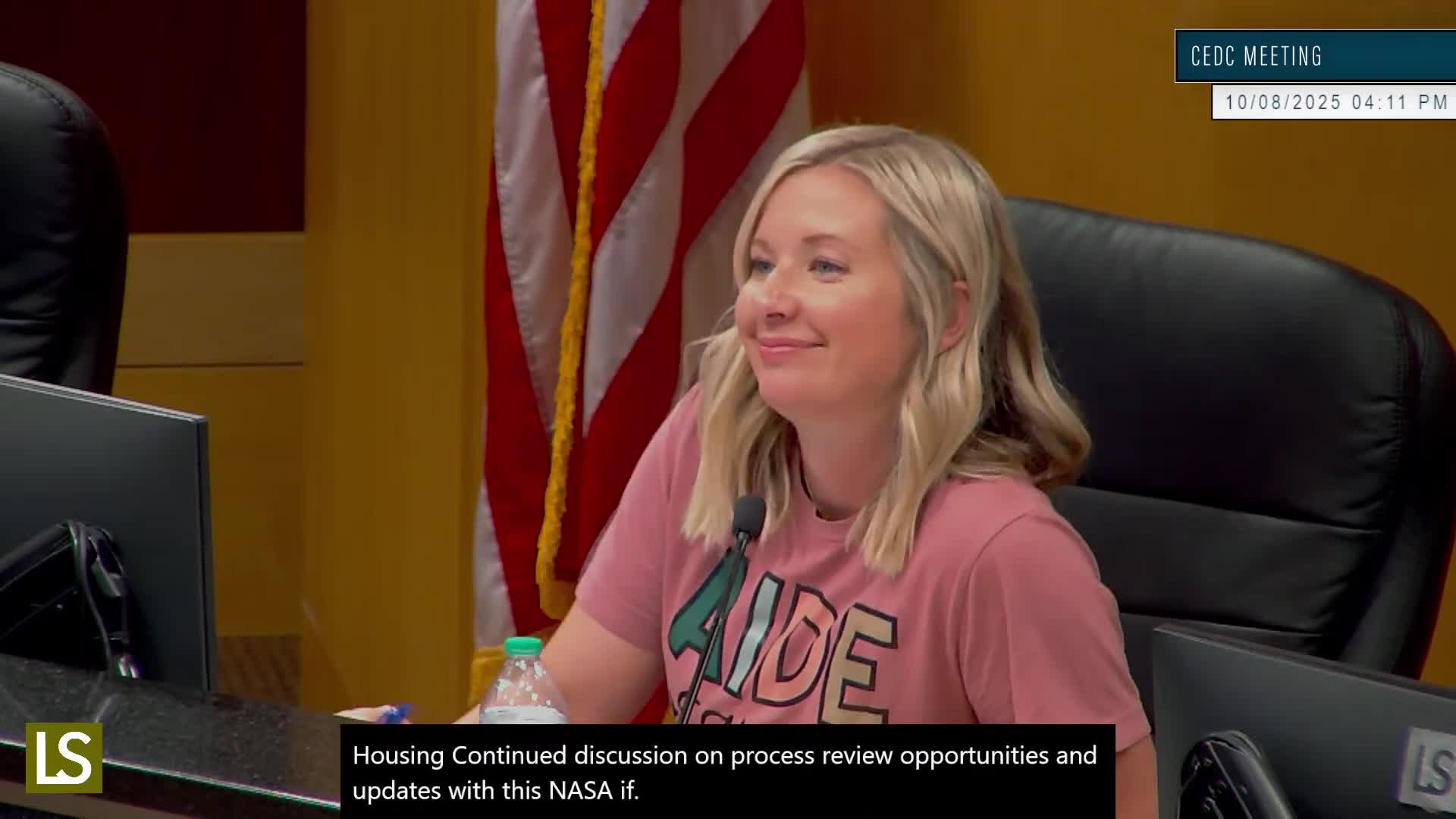Lee's Summit committee backs wide-ranging UDO changes to speed housing approvals
Get AI-powered insights, summaries, and transcripts
Subscribe
Summary
Lee's Summit's Community and Economic Development Committee on Oct. 8 agreed to forward a package of proposed changes to the city's Unified Development Ordinance to the planning commission and city council for public hearings, with staff directed to return with additional options on how to treat density changes for multifamily projects.
Lee's Summit's Community and Economic Development Committee on Oct. 8 agreed to forward a package of proposed changes to the city's Unified Development Ordinance to the planning commission and city council for public hearings, with committee members asking staff to return with additional options on how to treat density changes for multifamily projects.
The proposed changes are intended to reduce duplicative requirements and shorten review times for residential development and small-scale redevelopment, city staff said. Amy Nassif, deputy director of development, told the committee staff recommends removing architectural-elevation and total-square-footage requirements from the optional concept-plan submittal list and creating narrow exemptions and expanded administrative review for small single-family or duplex projects.
NUT GRAF: The revisions target multiple phases of the development process —concept plans, preliminary development plans (PDPs), revisions to approved PDPs, extensions, modifications and Board of Zoning Appeals (BZA) requests— with the stated goal of getting housing to market faster and lowering costs for minor projects. Staff emphasized that the proposals keep final code requirements and public-review steps intact; most changes shift routine or narrowly constrained decisions from months-long public hearings to shorter administrative reviews when the request stays within existing zoning limits.
Most important changes proposed and discussed
- Concept plans: Remove the requirement to submit architectural elevations and total square footage at the concept-plan stage so that the option remains flexible for applicants who do not yet have tenant or final design information. Nassif said those details would still be required when a preliminary development plan is filed.
- Preliminary development plans (PDPs): Create an exemption allowing single-family or duplex development of up to three lots (where zoning already permits the use) to proceed straight to final plan or building permit review instead of a full PDP that can take three to four months and cost several thousand dollars in application fees.
- Revisions and administrative review: Expand the list of changes that staff can approve administratively rather than routing them through the lengthy PDP revision process. Staff proposed that increases in density, lot coverage, floor-area ratio or height be allowed up to the limits already set by the property's zoning district (i.e., not exceeding what council originally approved). For other revisions the code would retain a "substantial change" bucket that requires full public review.
- Density for multifamily: Committee members asked staff to return with additional options for how increases in multifamily density should be handled. Staff suggested alternatives such as raising the administrative threshold (for example to 25%) or routing density increases to planning commission only; the committee requested more detail before finalizing that element.
- Extensions: PDP approvals would retain a 24-month base validity, but staff would be authorized to grant one administrative extension of 12 months (rather than requiring a council item) when conditions have not changed materially; further extensions or denials would continue to come to council.
- Modifications: Several narrow modification categories that currently go to planning commission would be moved to staff-level review to shorten review timeframes (for example, certain parking-lot design or RTU screening adjustments). Staff said city council retains authority over larger or policy-level modifications.
- Board of Zoning Appeals (BZA): Staff recommended expanding administrative approval for repair or replacement of existing single-family residential structures (excluding multifamily) so that staff could approve modest setback adjustments—proposed up to 15% but not to exceed 5 feet—without a BZA application, which currently costs about $500 and takes four to five weeks.
Staff framed the package as targeted, not wholesale zoning reform. "In summary for this first area, we're recommending updating the submittal requirements to remove the requirement for architecture and square footage during that time only," Nassif said during her presentation. She emphasized that the PDP and building-permit processes still require full details when projects proceed to construction.
Committee reaction and next steps
Committee members generally supported the streamlining approach but raised concerns about how changes to density —especially for multifamily projects— could alter the project the council originally approved. One member said changes to density "would make me nervous" and asked for safeguards that would preserve council input on substantive design and scale changes. Staff agreed to return with additional options and tradeoffs on the density item before council consideration.
The committee reached consensus to forward the UDO amendment package to the planning commission and city council for public hearings, with the density item flagged for additional options and discussion.
Why it matters
City staff said the current PDP process can take three to four months and cost several thousand dollars for small projects that meet code; shifting narrowly confined decisions to administrative review would cut review times to days or a few weeks in many cases, officials said. Staff cited examples (an Ovation project and a Longview redevelopment) where repetitive submittals or small revisions added months and cost to projects.
What the changes do not do
Staff and committee members repeatedly noted the recommendations do not remove existing zoning standards or council authority over rezonings; the changes are procedural adjustments to reduce regulatory friction for projects that already meet code. Where a request would exceed adopted zoning limits or create new impacts on circulation, utilities or neighboring properties, staff said it would remain subject to full public hearings.
Implementation and timeline
Nassif said the proposed ordinance language is nearly final and the next step is the public hearing process at planning commission and city council. Any move to adopt the amendments will require ordinance action by city council after public hearings.
